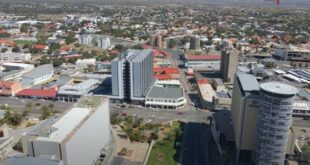The ruling African National Congress (ANC) has won South Africa’s parliamentary elections with 57.5 percent of the vote, the electoral commission has announced.
The ANC finished ahead of the Democratic Alliance (DA) on 21% and the radical Economic Freedom Fighters (EFF) with 11%.
The election result, which gives the ANC 230 seats in the 400-member parliament, means that President Cyril Ramaphosa, who replaced scandal-plagued Jacob Zuma last year, will be easily re-elected.
It’s a sixth straight victory for the ANC since 1994. But the result was the poorest electoral showing for the party, which has ruled South Africa since the end of apartheid 25 years ago.

Turnout was about 65% in the twin parliamentary and provincial elections – a drop compared to the 73% registered five years ago.
In a victory speech, Ramaphosa said the election confirmed “freedom and democracy reign” in South Africa.
“Let us now work together, black and white, men and women, young and old, to build a South Africa that truly belongs to all who live in it as proclaimed by our forebears,” Mr Ramaphosa told supporters in Pretoria.
He called for a South Africa “which is united, which is non-racial, which is non-sexist, democratic and prosperous”.
Support for the ANC, which gained 62 percent in the previous election in 2014, has steadily declined since it took a record 69 percent of the vote in 2004 – a trend analysts attribute to growing voter frustration over rampant corruption and high rates of unemployment.
Analysts say the election result puts pressure on Ramaphosa to redouble his efforts to regain greater public confidence by cracking down on corruption, fighting unemployment that runs at 27%, improving social service delivery and increase economic growth.
A big winner of the election is the far-left Economic Freedom Fighters (EFF), which, with 11 percent of the vote, an increase of five percentage points over its performance at its first election in 2014. The EFF is now the official opposition in three out of South Africa’s nine provinces.
Adira Kallo
 THE AFRICAN COURIER. Reporting Africa and its Diaspora! The African Courier is an international magazine published in Germany to report on Africa and the Diaspora African experience. The first issue of the bimonthly magazine appeared on the newsstands on 15 February 1998. The African Courier is a communication forum for European-African political, economic and cultural exchanges, and a voice for Africa in Europe.
THE AFRICAN COURIER. Reporting Africa and its Diaspora! The African Courier is an international magazine published in Germany to report on Africa and the Diaspora African experience. The first issue of the bimonthly magazine appeared on the newsstands on 15 February 1998. The African Courier is a communication forum for European-African political, economic and cultural exchanges, and a voice for Africa in Europe.
































